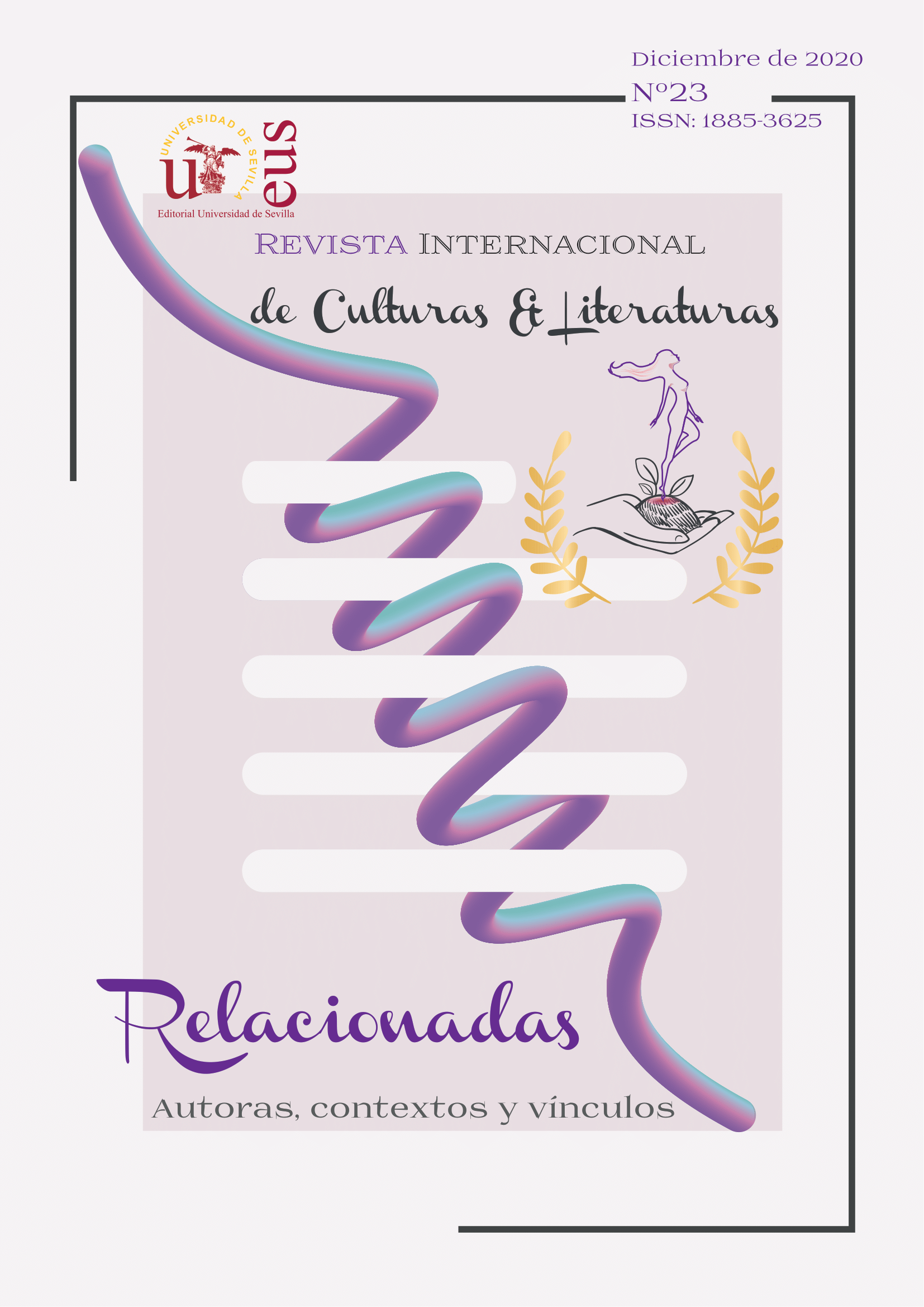DAVID FOSTER WALLACE’S DEMOCRATIC NORMALITY
DOI:
https://doi.org/10.12795/RICL.2020.i23.16Palabras clave:
David Foster Wallace, postmodernism, post-postmodernism, New SincerityResumen
"E Unibus Pluram" de David Foster Wallace es un relato del predominio de la ironía destructiva a fines del siglo XX. Tratando de liberarse del solipsismo provocado por el relativismo posmoderno, Wallace abrazó la sinceridad como la piedra angular del zeitgeist del nuevo milenio. Este artículo ofrece un análisis de dos fuentes de influencia destacadas que podrían considerarse como inspiración para la alternativa de Wallace a la ironía posmoderna: el trascendentalismo estadounidense y las investigaciones filosóficas de Ludwig Wittgenstein. Se hace con la intención de promover la comprensión del significado cultural de la obra del autor para la generación de escritores que siguieron su estela, y demostrar cómo la recuperación de los ideales románticos puede ser la clave para trazar la naturaleza del cambio de paradigma hacia el posmodernismo.
Abstract
David Foster Wallace’s “E Unibus Pluram” is an account of the prevalence of destructive irony at the end of the twentieth century. Trying to break free from the solipsism brought about by postmodern relativism, Wallace embraced sincerity as the cornerstone of the zeitgeist of the new millennium. This article offers an analysis of two salient sources of influence that could be considered as inspiration for Wallace’s alternative to postmodern irony: American transcendentalism and Ludwig Wittgenstein’s Philosophical Investigations. It does so with the intention of furthering the understanding of the cultural significance of the work of the author for the generation of writers that followed in his wake, and to demonstrate how the recovery of Romantic ideals may be the key to map out the nature of the paradigm shift to post-postmodernism.
Descargas
Citas
Berlin, I., The Roots of Romanticism, 2nd ed., Princeton, NJ, Princeton University Press, (1999) 2013.
Boxall, P., Twenty-First-Century Fiction: A Critical Introduction, Cambridge, Cambridge University Press, 2013.
Carlyle, T., On Heroes, Hero-Worship and the Heroic in History, London, Chapman and Hall, 1840.
Eggers, D., A Heartbreaking Work of Staggering Genius, London, Picador, 2000.
Eggers Dave. Foreword. Infinite Jest, by David Foster Wallace, London, Picador, (1996) 2006, pp. xi-xv.
Emerson, R. W., Nature. In The Norton Anthology of American Literature, vol. 1, edited by Nina Baym et al., New York, NY, Norton, (1836) 1998, pp. 1073-1101.
Emerson, R. W., Representative Men: Seven Lectures, Cambridge, MA, Harvard University Press, 1850.
Emerson, R. W., “Self-Reliance,” The Norton Anthology of American Literature, vol. 1, edited by Nina Baym et al., New York, NY, Norton, (1841) 1998, pp. 1126-1143.
Emerson, R. W., “The Over-Soul,” The Essential Writings of Ralph Waldo Emerson, edited by Brooks Atkinson, New York, NY, Random House, (1841) 2000, pp. 236-251.
Emerson, R. W., “Thoreau,” The Essential Writings of Ralph Waldo Emerson, edited by Brooks Atkinson. New York, NY, Random House, (1862) 2000, pp. 809-825.
Eshelman, R., “Performatism, or the End of Postmodernism,” Anthropoetics, 6:2 (2000-2001). Internet. 21-3-2020. .
Giles, P., “All Swallowed Up: David Foster Wallace and American Literature,” The Legacy of David Foster Wallace, Edited by Samuel Cohen and Lee Konstantinou, Iowa City, IA, University of Iowa Press, 2012, pp. 3-22.
Kateb, G., Emerson and Self-Reliance, Lanham, MD, Rowman & Littlefield, 2002.
Kelly, A., “American Sincerity and Good Posture: Emerson, Cavell, Wallace,” Department of American and Canadian Studies, Nottingham, University of Nottingham. Nottingham. May 13, 2015. Talk.
Kelly, A., “David Foster Wallace and the New Sincerity in American Fiction,” Consider David Foster Wallace: Critical Essays, Edited by David Hering, Los Angeles, CA, Sideshow Media Group Press, 2010, pp. 131-46.
Kirby, A., Digimodernism: How New Technologies Dismantle the Postmodern and Reconfigure Our Culture, London, Continuum, 2009.
Ladyga, Z., “The Return of the Pastoral: The Televisual Poetics of David Foster Wallace,” Projecting Words, Writing Images: Intersections of the Textual and the Visual in American Cultural Practices, edited by John R. Leo and Marek Paryż, Cambridge, Cambridge Scholars Publishing, 2011, pp. 235-247.
McCaffery, L., “An Expanded Interview with David Foster Wallace,” Conversations with David Foster Wallace, edited by Stephen Burn, Jackson, MS, University Press of Mississippi, 2012, pp. 21–52.
Saltz, J., “Sincerity and Irony Hug It Out,” New York Magazine, 27:05 (2010). Internet. 20-5-2020. .
Timmer, N., Do You Feel It Too?: The Post-Postmodern Syndrome in American Fiction at the Turn of the Millennium, Amsterdam, Rodopi, 2010.
Wallace, D. F., “E Unibus Pluram: Television and US Fiction,” Review of Contemporary Fiction, 13 (1993), pp. 151–94.
Wallace, D. F., Infinite Jest, New York, NY, Back Bay Books, (1996) 2006.
Wallace, D. F., “Octet,” Brief Interviews with Hideous Men, London, Abacus, (1999) 2009, pp. 111-136.
Wallace, D. F., “Westward the Course of Empire Takes its Way,” Girl with Curious Hair, London, Abacus, (1989) 2012, pp. 231-373.
Whitman, W., “Song of Myself,” The Norton Anthology of American Literature, vol. 1, edited by Nina Baym et al., New York, NY, Norton, 1998, pp. 2095-2138.
Wittgenstein, L., Philosophical Investigations, Translated by G. E. M. Anscombe, Oxford, Blackwell, 2009.
Wittgenstein, L., Tractatus Logico-Philosophicus, Translated by B. F. McGuinness and D. F. Pears, London, Routledge, 2001.
Wolfe, T., “Stalking the Billion-Footed Beast: A Literary Manifesto for the New Social Novel,” Harper’s Magazine, 279 (1989), pp. 45–56.
Wood, A. W., Hegel’s Ethical Thought, Cambridge, Cambridge University Press, 1995.

